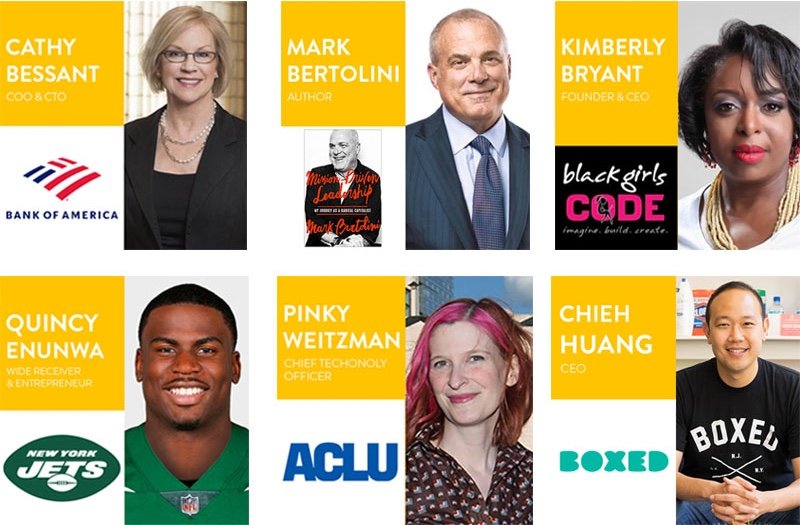If we’re doing our job here at Techonomy, we don’t just pick a theme when we’re planning a conference program–a theme picks us. Of course, we identified a big pattern before we began planning our Techonomy New York conference several months ago. The rubric for next week’s conference—as well as our November retreat at Half Moon Bay, California—is “Collaborating for Responsible Growth.” Working together responsibly is relevant, and growing more so.
But if we’re functioning with our ears to the ground–as journalists and business strategists–our role in assembling the sessions is to refine that further, to respond to the zeitgeist.
And right now, across the board, people are justifiably worried about tech.
One of the most eloquent speakers will be Cathy Bessant, Bank of America’s chief operating officer and chief technology officer. Here’s what she said when I asked what she wanted to talk about: “Will tech be a unifier or a divider? That, to me, is the fundamental question that impacts every other topic anybody would want to talk about–be it AI, data, privacy, or the future of the workforce. Will tech be a perpetuator of social problems, or a solution to them?”

In effect, that has become our theme. Investors who will speak on our New York stage are equally concerned. “We’ve got a very profound cultural problem within tech,” investor and tech and media strategist John Borthwick of Betaworks told us in a conversation preparing for the conference.
Karin Klein of the Bloomberg Beta venture capital firm concurred. “We’re at this inflection point about what tech is,” she said, lamenting the tech industry’s culture of “blitz-scaling at all costs.”

Back to Borthwick: “We ship a lot of crap as an industry. But tech is now the plumbing underneath everything. On that Ethiopian airliner [which crashed shortly after take-off last month] the pilots couldn’t manually override the software. Somebody shipped code that killed them.” He wonders if we should be certifying tech professionals–and decertifying them if they do harm. “An Uber self-driving vehicle hit a woman in Arizona and killed her,” he said, adding: “That coder maybe should be disbarred from writing code.”
This is what these speakers need to talk about right now. It’s what we all need to hear about. One speaker will explain how blockchain based platforms could, in future, build privacy into the internet to make abuse far harder. Another will talk about how she foresees a movement of engineers that will make tech more socially beneficial.

One of our most highly-anticipated speakers is Douglas Rushkoff, whose recent book, Team Human, is a manifesto for a new way of incorporating more thought about human needs in all that we do. Here is its opening line: “Autonomous technologies, runaway markets, and weaponized media seem to have overturned civil society…” And when we got on the phone with former Aetna CEO Mark Bertolini, author of a new book subtitled My Journey as a Radical Capitalist, the first thing he said was, “The big issue for a lot of people is the spread of inequality.”
The new Techonomy Magazine we’ll distribute at the conference reflects what we’ve learned. It has two covers–front and back. One asks, “Will Tech Destroy the Planet?” On the other: “Will Tech Save the Planet?” Like everybody else, we don’t know how this near-existential struggle over the future of society is likely to go.
We could deeply feel this moment of recalibration as we assembled sessions on health care, the future of politics, children and media, the governance of artificial intelligence, the internet of things, the industry of wellness, and the growing crisis in security. You will feel it too as you experience our program.

Tech’s societal impact will be the central issue we discuss with two Democratic presidential candidates in New York on May 15th– Andrew Yang and John Delaney. Yang’s entire campaign is driven by his concern about job displacement and human harm in an age of automation. He advocates a guaranteed basic income. Delaney is more optimistic. As a congressman from Maryland, he created the House of Representatives’ AI caucus. But he also has said “we need to update the social contract with each new wave of change.”
This debate will be reflected, too, when we talk about U.S.-China relations. The two countries hold diametrically opposite views of the role of the internet. Then there’s the panel The Internet Civil War, moderated by Wired’s Nicholas Thompson. The struggle over tech for good or evil is global, and playing out vividly on Facebook and Google and in national elections in Brazil, the Philippines, India, and in fact everywhere.

Tuesday the 14th a top speaker will be Jared Cohen, a prescient longtime observer of and participant in tech who just wrote a superb book, Accidental Presidents, about vice presidents who became president. But he also heads a technology incubator inside Google called Jigsaw. If you go to its website, the first words you see are: “How can technology make people in the world safer?”
















